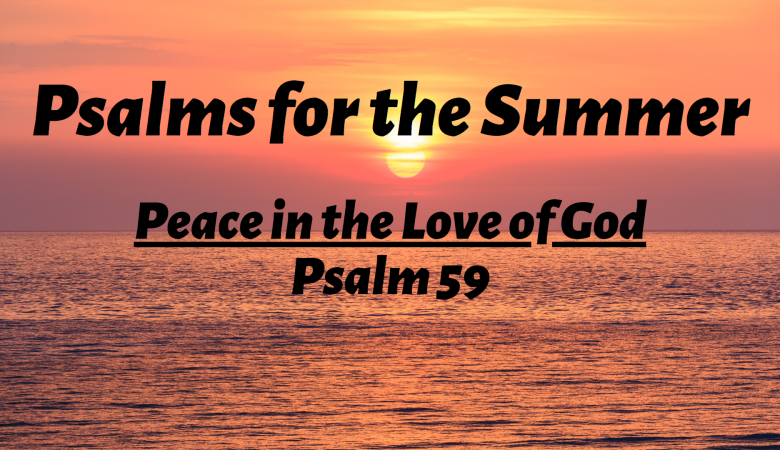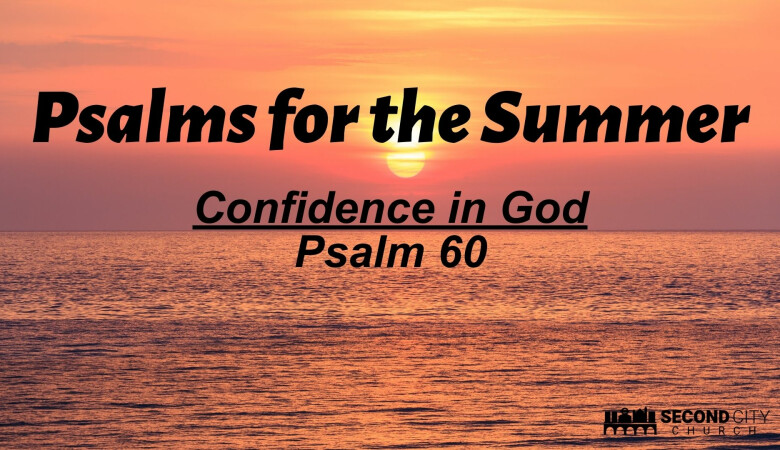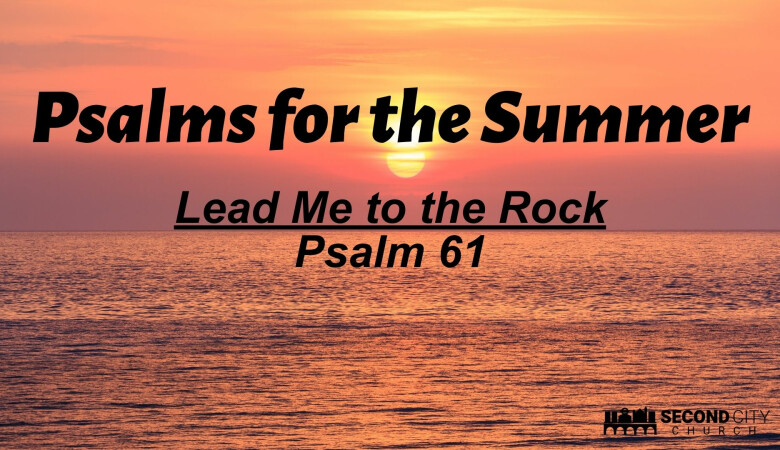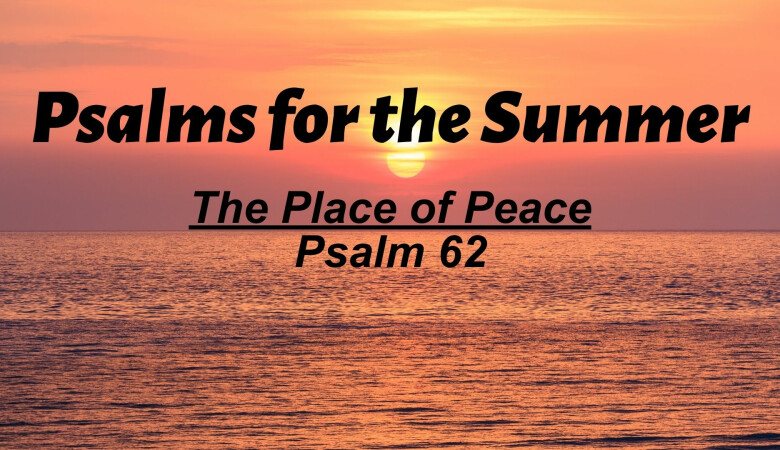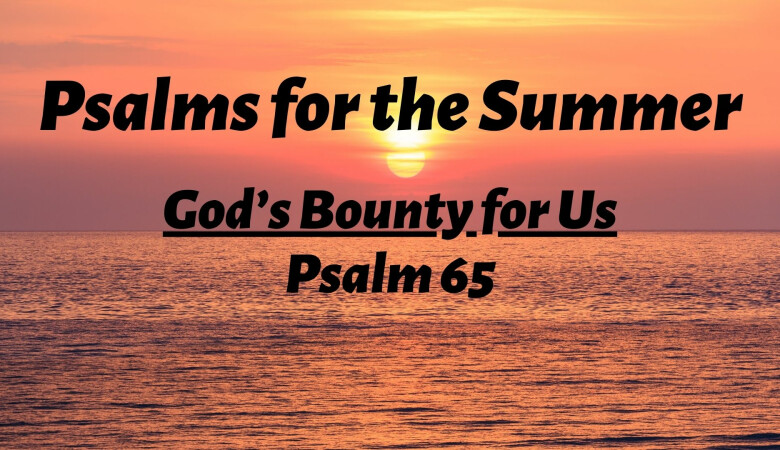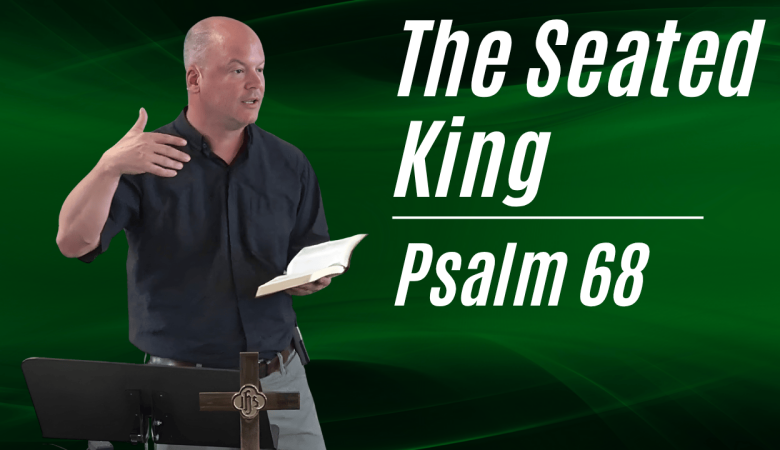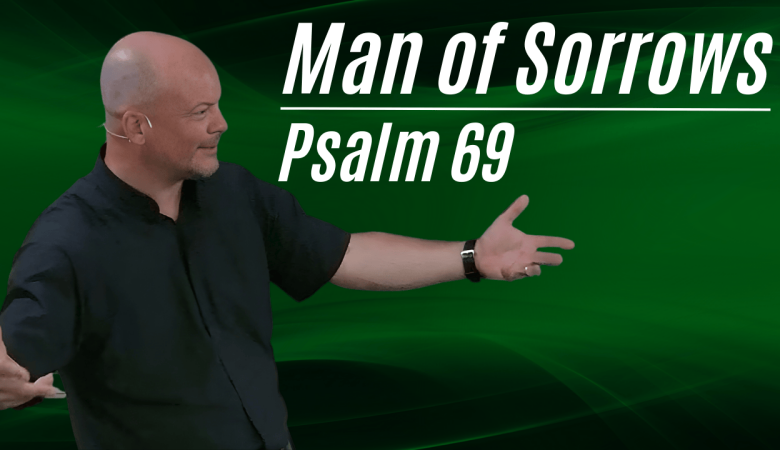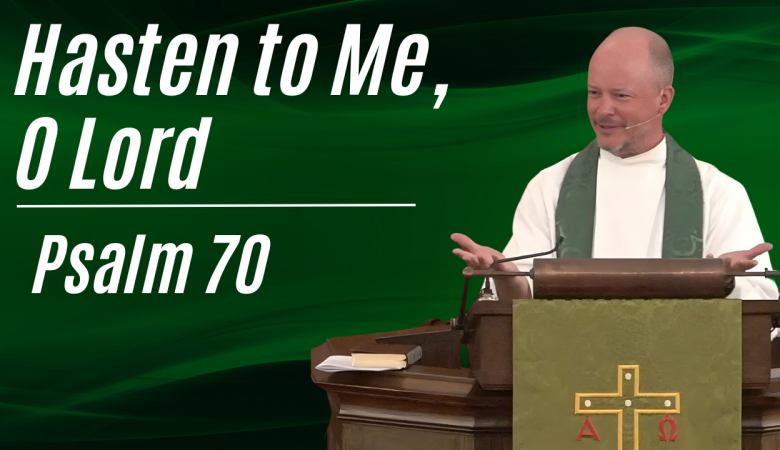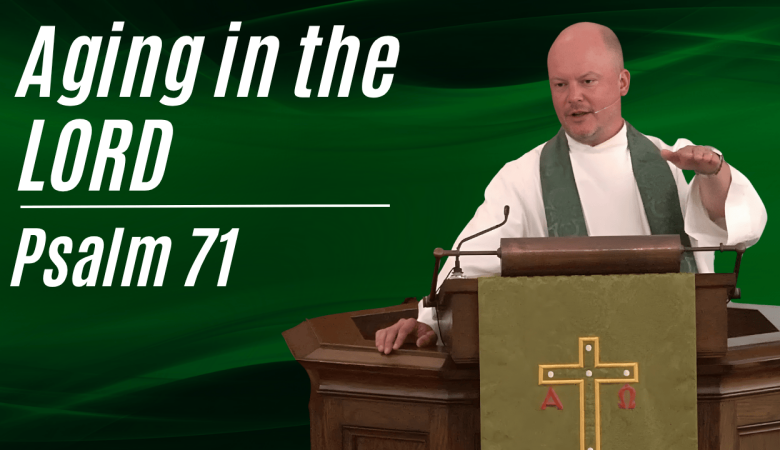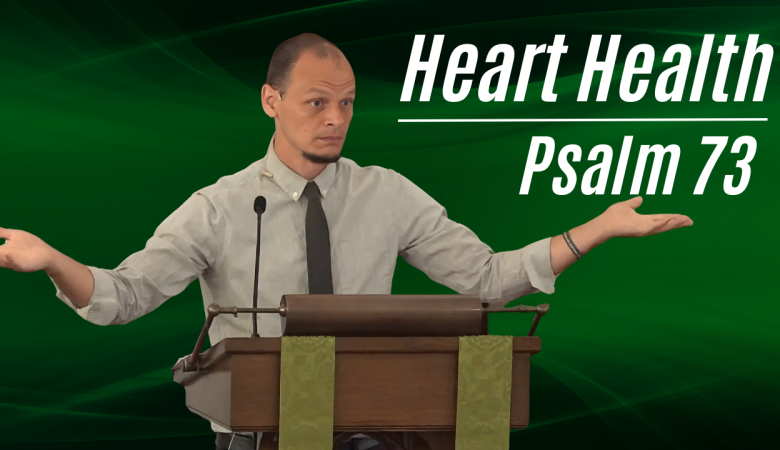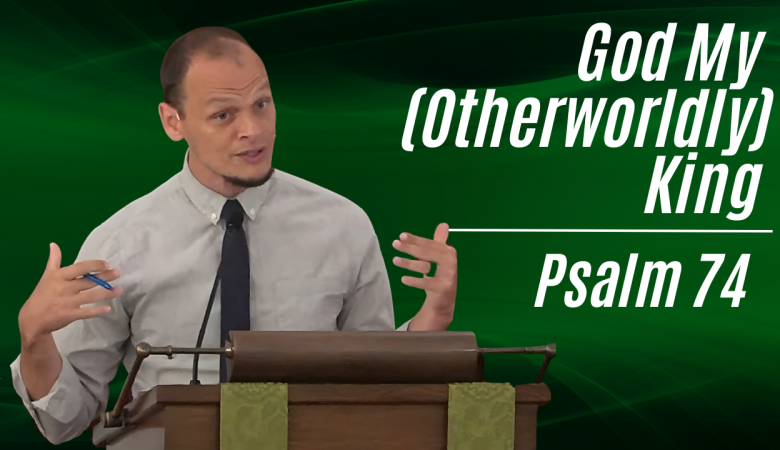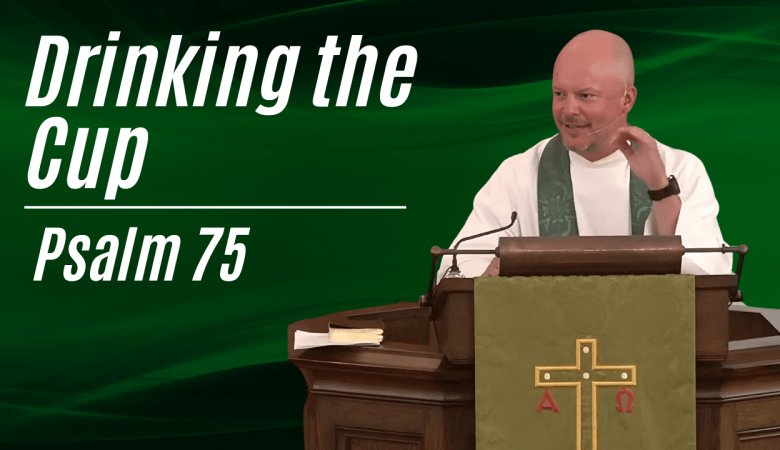Series: Psalms for the Summer
Beating Hearts as One
June 15, 2025 | Peter Rowan
Passage: Psalms 66:1-20
Summary
Psalm 66 is a psalm of praise. It is a psalm both praising God for who he is and what he has done and calling others to praise him. It begins wide, calling all the earth to praise and narrows down to the individual. It's a very fitting psalm for Trinity Sunday, as the call to the earth reflects the Father, the call to the church, the Son, and the call to the individual, the Holy Spirit.
Transcript
Let’s pray again, Lord. We do. Again, thank you for your word. And we pray as we turn to it that we would be drawn to worship you more and more because of who you are, Father, Son, and Holy Spirit, because of what you have done in creation and our salvation and our preservation. Lord, draw us into greater praise and worship with you. We pray. Amen.
All right. Good morning again. We are back in the Psalms once again. And you may be wondering, when did we let off from the Psalms? It was two summers ago because I wasn't here with you last summer. But other than last summer, we have been in the Psalms every summer now for 10 years. I started this job actually 10 years ago this month. And we began with Psalm 1. And we are now to Psalm 66. And at this rate, we will be done in about 12 years. Praise the Lord. Praise the Lord. Praise the Lord.
I thought because this occasion I want to do this. I thought I'd explain to you some of my approach with preaching. Okay. So in the fall, typically what we have done is we have alternated between non gospel, New Testament text, New Testament texts, and various Old Testament passages. Then in Advent and Christmastide, we've typically looked at various series that kind of prepare us to celebrate the coming of Jesus and help us to celebrate the gift of Christ and his incarnation. Then often in Epiphany, which is the beginning of January, through to Easter, often epiphany and Lent, though we've done a couple series just in Lent, like considering the work of the cross and why Jesus had to die and things like that. Typically, during that time, we have been in the Gospels, so this year we were in Mark, but for years we were in Luke during that time. And then during Easter season, we've typically taken a series. We've looked at the fruit of the Spirit and our mission statement as a church. This year we consider what does it mean to be a body in light of the resurrection of Christ? What does it mean to be the church in light of these resurrected passages, how Jesus engages with his disciples?
But part of what I want to do with that is I want to give you a diet of the Bible. You know, my hope is that if you're here for a little while, you are engaging with a lot of different passages from Scripture. And you're we're told that all of Scripture is breathed out by God, and it's useful for correction and teaching and training and righteousness and all of the rest. And parts of Scripture speak of God's authority and his creative power. And some of it speaks Specifically about His salvific works, his works of salvation on behalf of his people. Others speak about how he's guiding us and all the rest. But we know God best by considering all of his words to us. And so my hope is that over time, we kind of seep into it. If you're here for a little while, and today we are in Psalm 66. There's a lot of different categories for Psalms. Psalm 66 is a Psalm of praise and thanksgiving. So it's calling us to praise, and it's praising God for what he's done.
So you've probably turned the Bible a few times, as Sylvia told you, different passages to look up. But I want to invite you to look at Psalm 66 this morning. So you can turn there. If you brought a Bible with you, you can open up that Bible. If you don't, maybe grab the Bible in front of you. If you don't have a Bible, please take that Bible that's in front of you with you. We'd love for you to have it, love for you to read it, check it out, maybe ask questions of other people and learn about the Lord from His Word.
As you open up Psalm 66, what you immediately notice, though, is this. Is this call to praise, right? It says, shout for joy to God all the earth. Sing the glory of his name. Give to him glorious praise. If you actually jump down to verse eight, it says, bless our God, O peoples. Let the sound of his praise be heard. And actually if you go down to the very end there, the last verse, verse 20, again, it says, blessed be God. Kind of clearly this psalm of praise is calling others to praise him, to worship him, to adore Him.
And I want us to walk through this psalm together. And I want. Part of what I want you to see is how it kind of takes this wide, expansive call, and then it narrows it down. But also, given that this is the Sunday of the year where we particularly reflect on the Trinity, I want to see. I want you to see how this. These movements actually call us into praising God, Father, Son and Holy Spirit. It's large, it's expansive, and yet it's also intimate and it's personal. Okay?
So I want to sort of illustrate this a little bit with this. One of the most dramatic symphonies, or actually, I would say sort of performative symphonies in a way, is Haydn's Symphony 45 in F sharp Minor. I'm sure, as I mentioned, that you're like, oh, the F sharp minor one. Maybe you are, maybe you aren't. But maybe, as I mentioned, actually it's other title, you might recognize it, it's known as the Farewell Symphony. And what's so remarkable about this symphony is that it begins with all of the different orchestral instruments, and their players are up front and they're playing along. And as it goes and as it nears the end, you have different players stop playing their instrument and walk off the stage. I would encourage you later on, not right now, to look up this symphony, Farewell Symphony, on YouTube. There are some great performances. Some of them are actually kind of funny, where one, I think, cellist takes out a handkerchief and, as though he's throwing in the towel, throws it on the ground before he walks out. And then this other lady, she's like one of the last ones to walk out, she takes her bow and she puts a white towel at the end and starts waving it as though it's a surrender flag. It's kind of humorous. But the very first time this was performed, the lanterns that illuminated the music sheets of the musicians, they would snuff them out as they walked off the stage. And you can just imagine the drama as this whole body is playing this beautiful piece of music. And then it narrows down and at the end, there's just two violinists there on stage as it ends.
But of course, what's remarkable about this is that the music is lovely in its grandeur at the beginning. I mean, it's a beautiful piece of music and all the parts are playing together and it's so lovely. And yet that beauty does not diminish as it kind of narrows down to the end. It still grabs your attention, it still delights the ears, the beauty and the importance of the collective together and of the individual part. Okay? That's part of what's happening in this psalm. And I want to suggest to you that that's part of what's happening in the psalm in terms of the great call to all of us to praise the Lord and the call of each individual to praise the Lord. And it's also true in the psalm of who God is in all of his plurality and majesty and in the singular ways in which he works. Okay, so look with me again at the beginning of Psalm 66.
I'm going to read these first four verses for you again. Shout for joy to God all the earth, Sing the glory of his name. Give to him glorious praise. Say to God how awesome are your deeds, so great is your power. Your enemies come cringing to you, all the earth worships you and sing praises to you. They sing praises to your name. It's just expansive, right? Actually twice as all the earth. All of it, all of it is to worship. And of course, part of that is mentioned here is because his deeds are awesome. They're awe inspiring. He speaks and the world comes into being. His authority is over all things. His power is so great to those who oppose him, they come to nothing. All the earth, because of how great he is, simply by his being. His awesomeness is to worship the Lord.
Then you have this word salah there. And quite honestly, the truth is, we don't really know what that means. I kind of love that. I kind of love it. Like I love when the New Testament author says somewhere it's written and it quotes the Old Testament, like I do that sometimes. It was written somewhere, this. And I can't remember the reference, but it's there because it keeps us humble, right? And there's words that the Bible uses that actually we're not entirely sure what it means. That's why we use the Hebrew there. But most people, and with good reason, believe that salah means something like pause, wait, rest. Almost certainly it's a musical term because it's a change in the movement. There's some shift that's happening and there's some way of saying, wait a sec. And in my mind it was most likely because somebody needed to grab the electric guitar and start doing a solo, you know, or rather David was grabbing the lute or the lyre, which was more like one of these U shaped things with strings and going like this, you know. But the point is that the salah in some ways is a little bit of a shift. It's a little bit of a pause.
And so there actually is a little shift here. The collective, all of the earth, the expansive collective, all of the earth begins to narrow down, okay, so. And it begins to narrow down from simply the God who is awe inspiring because he's over all things to the God who invites. And actually our praise is demanded because he has acted for the salvation of his people.
So we pick up verse five, come and see what God has done. He is awesome in his deeds. Toward the children of man. He turned the sea into dry land. They passed through the river on foot. There did we rejoice in him who rules by his might forever. Whose eyes keep watch on the nations. Let not the rebellious exalt themselves. Salah say he turned the sea into dry land. So the psalmist has moved right from this all expansive idea to this collective people of God, right? He says, come and see what God has done.
And he turned the sea into dry land. And it's like, oh, think specifically of what he's done for you. Think together he's saying about what God has done for you, how he has saved you, how he worked for you. Think about how he brought you out of Egypt when you were slaves. Think of how he knew how the Egyptians were coming. And your fear, looking at the waves and thinking, there's no way that I'm going to be saved here. And yet even in the midst of that fear, he not only causes you to come to safety, but he does. So dry land, think about the amazing act of God's salvation for you.
And then it says praise. And this praise here, what I'm saying is that it moves from this all expansive everything to this collective still. It's still a body that has been saved together. So the Praise in verse 8, Bless our God, O peoples, let the sound of his praise be heard. It's this everything, all creation, all the earth. But he is our God. He has acted for us.
Now the next section has to do with being tried and tested, but also being led, being guided, being brought to safety. And here he's again narrowing it down. It says repeatedly, us, right? He says, you brought us into the net. You brought us also to the place of abundance. So the trying is of God collectively. It's also bringing the people of God collectively to a place of abundance. Just like the reference to the Red Sea here, the trying of God's people. But it's the safety with which God or to which God leads them.
And this kind of movement again moves from the our to the us and then actually eventually to the eye. It leads to the praise of the individual. There's a narrowing that's taking place. And so when you actually get towards the end, verse 13 says, I will come into your house with burnt offerings. I will perform my vows to you. I will offer you burnt offerings of fatted animals. I will make an offering of bulls and goats. Do you see how this is a narrowing down? And it's a narrowing in some ways with, with the ways that God acts. First he's over all things awesome are his deeds. Then there's this collective thing. He's brought us through the sea on dry land. And then it's specifically, he's dried us, he's tested us, he's brought us to a place of abundance. The all the earth leads to our people leads to I. I final statement of praise is blessed be God, because he's not rejected my Prayer. Each of the calls to praise make this movement all the earth. Blessed be our God. He's heard my prayer. Steadfast love is for me.
So it's been mentioned that this is Trinity Sunday. Trinity Sunday is the day in the calendar of the church where we just reflect together on the revelation of God as Father, Son and Holy Spirit. And that means that last Sunday was Pentecost. Some of you were here at as we worshiped on Pentecost Sunday. And that Sunday is remembering both the first Pentecost, the 50 days after Passover when God met with his people there on Mount Sinai, but also 50 days after the resurrection, when the Spirit of God descended in Acts chapter two on the disciples and those there in Jerusalem. Anyway, today is a day that we remember specifically this reality that God is Father, Son and Holy Spirit. Diversity, unity.
We're going to say together the Athanasian creed. And I'm telling you this right now because it's not what we normally say and it's long and it's. Maybe it's going to feel cumbersome for you, but it's one of the great statements, creedal statements of the Trinity. And maybe as I say that you have heard this said, hey, the Trinity is not in the Bible. Maybe you've heard this. You know, one of the great things about Christian theology that's not even found in the Bible. Well, the fact is the word Trinity is not in the Bible, but the Trinity is all throughout Scripture. You think with me just how Jesus says, go and baptize in the name of the Father, the Son and the Holy Spirit, or our Romans passage talks about the Father, the Son and the Spirit all working together for our salvation. One God, co equal, co eternal.
And I want to suggest to you that in a way, we actually have the Trinity right here in Psalm 66. Okay, I understand. It doesn't say here's the Trinity right here in Psalm 66. All right. But I think we, we have the work of the Father, the work of the Son and the work of the Spirit here. And I think these various aspects of the Trinity, the work of the Trinity actually reflects this sort of movement from the grand down to the particular in a way. Okay?
So when we think of all the earth shouting to joy to God for joy for his awesome deeds, I think it's right for us to think of the work of the Father. We're told in First Corinthians 8, 6, yet for us there's one God, the Father, from whom are all things and for whom we exist. And Then actually in Revelation 4:11, there's this worship of the of the Father taking place and says this worthy are youe, O Lord and God, to receive glory and honor and power. For you created all things, and by youy will they existed and were created. What we have is this sense of all things should be worshipping the Father because He is awesome. He is over all. What we can say is that all the earth there is to praise the fatherly reality of God, God as Father.
But then what I said, actually, when this psalm turns to say, hey, the people of God, the collective people of God should also be praising Him. This isn't a call just to all the earth, but specifically to the Church. What we see when we do that, when we made that turn, is in Psalm 66. What it's saying is you need to do it because of how God saved you. Remember his acts in history to save you out of slavery and to bring you to Himself. Well, as Christians, we would say, dies the work of Jesus. The great act of bringing us from being slaves to bringing us to being sons is the historical work of Christ on the cross and in the resurrection. And so again, actually, we could look at the very same passage, First Corinthians 8, 6. It goes on to say, and one Lord Jesus Christ, through whom are all things and through whom we exist, is what it says. We exist as a body, the Church, because of the definitive historical acts of Christ for us. So we ought to praise Him.
The collective people of God exist because of the work of the Son. And actually we can look at the very next, the very next passage in the book of Revelation, chapter 5. Not only is the Father to be praised in Revelation 4, but the Son is to be praised in Revelation 5, and he's to be praised because of his works of salvation in history. So this is what it says in that chapter. Worthy. Are you referring to the Lamb there to take the scroll and to open its seals, for you were slain, and by your blood. You ransomed people for God for every tribe and language and people and nation, and you've made them a kingdom and priests to our God, and they shall reign on the earth. So you can see the collective people of God are to worship Jesus the Son because of his works of salvation for them as a collective people.
Okay, big expansive thing is narrowing down, but also here's what I want to suggest to you is that we see the work of the Spirit here also. This psalm, I think, is calling us to praise God as Holy Spirit also. And think with me about how Jesus was led into the desert to be tempted. What it says actually in that text there in Matthew chapter four, it says the Spirit of God led him there, but as he was tempted, the Spirit of God led him through that and into a place of abundance. Jesus tells us in John chapter 14 that the Spirit is our counselor in John chapter 16, that he's the one who will guide us into all truth. This is the exact language that is being used here in this psalm. Here in Psalm 66, we have a call to praise God because He's awesome, because his works of salvation, but also because he guides his people. And sometimes he guides his people's people into trials. But through those trials, through those valleys of the shadow of death, he brings them into the place of living water and abundance.
What I'm saying is this text here, it starts expansive and it narrows down to the individual. And in so doing, it's actually calling us collectively and individually to worship the Trinity, who is collective plurality and yet one unity. Part of the doctrine of the Trinity is that it teaches us that God loves us as Father, as the Almighty Father who's over it all, that he loves us as Son, who redeems us from our slavery to sin, historically, in time and in space. Also that he loves us intimately. Specifically, when the doctrine of the Holy Spirit is that God is with you, particularly he abides within you. He's made his dwelling in you individually.
The fact is that all these things together are all the more reason to praise the reality of God as Trinity should lift all of our hearts, all the more to offer him our praise and our worship. We were made in the image of God. Genesis tells us that. It says, let us make man in our image. The Father that was there ordering, the Son there speaking the word with God in the beginning, the Spirit there hovering, all creating. But also the Bible says that they are all in recreation too. God's love is for you as Father, as Son and as Holy Spirit. His redemptive work is for you as Father, as Son, and His Holy Spirit, all of it together is working together to help us sing his praises. Live as we are called to live. Worship as we are called to worship.
Let me circle back to music as a way of kind of closing. Some of you have probably heard, and I wonder actually if you've experienced this, that music actually is very good for your heart health. And actually, specifically the beats of music are good for your heart health. And so you can listen to certain music and actually your heart will begin to beat to certain music. So it can have a calming presence. It can actually have a strengthening presence too, as it beats in a certain way. There's been remarkable studies that have been done that music beats can affect heart health.
But you maybe. Because I feel like maybe I mentioned this years ago here, of course, this is. You know, some of you were not there at this time, but maybe you've also heard that there have been some studies that have been done about the effects of collectively singing. And specifically, quite a few of these studies have been done with regards to choirs singing hymns. Actually, interestingly, that in their various parts, as they keep beat together, their hearts actually begin to beat in unison. One of the articles I read this week was from about 12 years ago, Salongranska Academy. I don't know if I'm saying that right. At the University of Gothenburg in Sweden, they did a study a while back looking specifically at the heartbeats of choir. And so they would put this pulse monitor on each individual singer. And what they found is that at the beginning they weren't beating together. And then after a while, actually the music would cause their hearts to beat as one. Individually, they're still themselves, and yet collectively they're working together.
This is the call to praise. It's an expansive call that's calling each one of you in all of creation, and yet it's calling you as individuals, right, to praise this God. And as you think of this, I want you to think about this is exactly what God is doing, because this is who he is. God, diversity and unity, beating individually, acting individually for us, and yet working collectively for us. And this is what God calls you to. To praise him, to worship him, and to let your hearts then beat individually as one, praising God, Father, Son and Holy Spirit for who he is and for what he's done.
Let me pray for us. Lord God, we think of this psalm that is, it feels so big at the beginning, and then it gets so intimate. That is us individually, one of us that matters, that our individual praise, our individual offerings matter, that you work as the Almighty God and as the one who is with us as a church. And then further as the one who is dwelling within each one of us, as the Holy Spirit, the guide, the counselor, the leader. God, we bless you for this reality that you are Father, Son and Holy Spirit, that you meet perfectly in your diversity as one God. I pray that as we lean into your praise, that we would reflect your reality, that we would be a church that loves our differences to delights in them, and yet beats as one. Because we reflect this reality of those who have been saved by Almighty Father, Redeeming Son, Holy Spirit, in whose name we pray. Amen.
Series Information

Every summer Peter and an occasional guest speaker take us through the Psalms. Of the Psalms Luther said " the Psalter is a book of all the saints, and everyone, whatever his situation may be, finds psalms and words in it that fit his situation and apply to his case so exactly that it seems they were put in this way only for his sake..."



